- Home
- William Golding
Darkness Visible Page 2
Darkness Visible Read online
Page 2
The captain snarled.
“Oh—Christ!”
He ran forward himself, the others at his shoulder, and did not stop until he was where the air cleared and the heat from the fire became a sudden violent attack on the skin.
The figure was a child, drawing nearer. As they picked their way past the new crater they saw him plain. He was naked and the miles of light lit him variously. A child’s stride is quick; but this child walked down the very middle of the street with a kind of ritual gait that in an adult would have been called solemn. The captain could see—and now, with a positive explosion of human feeling—why this particular child walked as it did. The brightness on his left side was not an effect of light. The burn was even more visible on the left side of his head. All his hair was gone on that side, and on the other, shrivelled to peppercorn dots. His face was so swollen he could only glimpse where he was going through the merest of slits. It was perhaps something animal that was directing him away from the place where the world was being consumed. Perhaps it was luck, good or bad, that kept him pacing in the one direction where he might survive.
Now they were so near that the child was not an impossibility but a scrap of their own human flesh, they became desperate to save and serve him. Their captain, indifferent now to the slight dangers that might ambush them in the street, was the first to reach the child and handle him with trained and devoted care. One of the men raced in the other direction without being told, to the phone a hundred yards away. The other men formed a tight and unprofessional knot round the child as he was carried, as if to be close was to give him something. The captain was a bit breathless but full of compassion and happiness. He busied himself with the kind of first aid for burns which is reversed by the medical profession every year or so. In a very few minutes an ambulance came, the team was told all the nothing that was known about the child and he was driven away, the ambulance bell ringing, perhaps unnecessarily.
It was the dimmest of the firemen who expressed the general feeling.
“Poor little bugger.”
All at once they were talking to each other enthusiastically about how incredible it was, a kid walking out of the fire like that, stark naked, burnt but going on, steadily making his way towards a glimpse of safety—
“Plucky little bugger! Didn’t lose his head.”
“They do wonders now. Look at them pilots. Getting faces as good as new they say.”
“He might be a bit shrivelled like, down the left side.”
“Thank Christ my kids are out of it. And the missus.”
The bookseller was saying nothing and seemed to be staring at nothing. There was a memory flickering on the edge of his mind and he could not get it further in where it could be examined; and he was also remembering the moment when the child had appeared, seeming to his weak sight to be perhaps not entirely there—to be in a state of, as it were, indecision as to whether he was a human shape or merely a bit of flickering brightness. Was it the Apocalypse? Nothing could be more apocalyptic than a world so ferociously consumed. But he could not quite remember. Then he was deflected by the sounds of the musician being sick.
The captain had turned back to the fire. He looked down a street that in the event had proved neither as hot as they supposed nor as dangerous. He jerked his attention away from it and back to the machine.
“Well. What are we waiting for? They’ll want to tow us if we can be towed. Mason, try the steering and see if you can free it. Wells, come out of that trance! Start tracing the brake lines—quickly now and cheerfully!”
Under the machine, Wells swore horribly and profoundly.
“Now then Wells, you’re paid to get your hands dirty.”
“The oil went straight into me fucking mouth!”
A burst of sniggering—
“Teach you to keep your mouth shut!”
“What’s it taste like, Wellsy?”
“Can’t be worse’n the canteen!”
“All right lads, turn it up. We don’t want the breakdowns to do our work for us do we?”
The captain turned back to the fire. He looked at the new crater half-way down the road. He saw quite clearly in a kind of interior geometry of this and this and that and that how things had been and how they might have been and where he would have been running if he had set off at the very first moment he had realized the child was there and needed help. He would have run straight into the space where now there was nothing but a hole. He would have run into the explosion and he would have disappeared.
There was the clatter of a part falling under the machine and another burst of cursing from Wells. The captain hardly heard it. The skin had seemed to freeze on his body. He shut his eyes and for some sort of time saw that he was dead or felt that he was dead; and then that he was alive, only the screen that conceals the workings of things had shuddered and moved. Then his eyes were open again and the night was as normal as that kind of night could ever be, and he knew what the frost was on his skin and he thought to himself with the cunning immediacy that was part of his nature that it just didn’t do to examine such things too closely and anyway the little chap would have suffered just as much and anyway—
He turned back to his own smashed machine and saw that the tow was coming. He came, silent and filled in an extraordinary way with grief, not for the maimed child but for himself, a maimed creature whose mind had touched for once on the nature of things. His chin was quivering again.
The child was called number seven. After the kind of holding operations that had to be performed while he recovered from shock, number seven was the first present he got from the world outside him. There was some small doubt as to whether his silence was organic or not. He could hear, even with the ghastly fragment of ear on his left side, and the swelling round his eyes soon subsided so that he could see well enough. He was contrived a position in which he did not have to be doped very much and spent days and weeks and months in it. But, though the burnt area reckoned as a percentage of the whole made it improbable, he did in fact survive, to begin a long progress through hospitals of one sort of expertise or another. By the time he had come to speak his occasional word of English it was impossible to discover whether it was his native tongue or whether he had picked up the word in hospital. He had no background but the fire. He was known in successive wards as baby, darling, pet, poppet, sweetie and boo-boo. He was at last given a name because a matron put her foot down, a thing of power. She spoke roundly.
“We can’t go on calling the child number seven behind his back. It’s most improper and injurious.”
She was an old-fashioned matron who used that kind of word. She was effective.
The appropriate office was working through the alphabet in rotation, since the boy was only one among the wreckage of that childhood. The office had just presented a baby girl with the name “Venables”. The young wit who was given the job of using “w” suggested “Windup”, her chief having displayed less than perfect courage in an air raid. She had found she could get married and still keep her job and she was feeling secure and superior. Her chief winced at the name and drew his pen through it, foreseeing a coven of children all shouting “Windup! Windup!” He made his own substitution, though when he looked at what he had written it seemed not quite right and he altered it. There was no obvious reason for doing so. The name had first jumped into his mind with the curious effect of having come out of empty air and of being temporary, a thing to be noticed because you were lucky to be in the place where it had landed. It was as if you had sat silently in the bushes and—My!—there settled in front of you the rarest of butterflies or birds which had stayed long enough to be seen and had then gone off with an air of going for ever, sideways, it might be.
The boy’s current hospital accepted “Septimus” as a middle name but made no use of it. Perhaps it had overtones of “Septic”. His first name, Matthew, became “Matty”; and as “Seven” was still written on all the relevant papers, no one used his surname. But t
hen, for years of his childhood, all visitors had to peer among sheets and bandages and mechanisms to see any part of him but the right side of his face.
As the various aids to recovery were removed from him and he began to speak more, it was observed that his relationship to language was unusual. He mouthed. Not only did he clench his fists with the effort of speaking, he squinted. It seemed that a word was an object, a material object, round and smooth sometimes, a golf ball of a thing that he could just about manage to get through his mouth, though it deformed his face in the passage. Some words were jagged and these became awful passages of pain and struggle that made the other children laugh. After his turban came off in the period between the primary work and what cosmetic work was possible, the ruin of his half-raw skull and blasted ear was most unappealing. Patience and silence seemed the greater part of his nature. Bit by bit he learnt to control the anguish of speaking until the golfballs and jagged stones, the toads and jewels passed through his mouth with not much more than the normal effort.
In the illimitable spaces of childhood, time was his only dimension. Adults who tried to establish contact with him were never successful with words. He accepted words and seemed to think long about them and sometimes he answered them. But it was a dissociated traffic out there. He was, at this time, to be approached by a method beyond conceptual artifice. Thus the nurse who squeezed him with her arms, knowing just where his body could bear the contact, found the relatively good, relatively undamaged side of his head burrowing against her breast in wordless communication. Being, it seemed, touched being. It was natural that this girl should discount what further thing she had noticed, since it was too delicate, even too private a perception to be called awareness of a symptom. She knew herself not to be particularly intelligent or clever. So she allowed the awareness to float in the back of her mind and paid no particular attention to it, only accepting that she, more than the other nurses, now knew the Matty-ness of Matty. She found herself saying things to herself that would mean one thing to others but something quite different inside her.
“There’s Matty thinking I can be in two places at once!”
Then she would find what she had noticed was blown away or rendered massively inaccurate by the words her mind had accidently wrapped round it. But it happened too often and it settled into a pattern of belief that she accepted as a kind of definition of his nature.
Matty believes I’m two people.
Then later and even more privately—Matty believes I bring someone with me.
There was a delicacy in her mind that knew this belief to be unique to Matty and not to be discussed. Perhaps she felt a certain delicacy about the nature of her own mind in its surely unusual working. But she felt nearer this child than the others and she showed it in a way that the other children resented because she was pretty. She called him, “My Matty”. When she did that it was the first time since his emergence from the furnace that he was observed to employ the complex musculature of his face in a communicative way. The rearrangement was slow and painful as if the little mechanism was in need of oil, but there was no doubt about the end-product. Matty was smiling. But his mouth remained lopsided and closed all the time, which made the smile unchildlike and seemed to concede that though smiling was possible, it was not a common practice and a wicked one if indulged in often.
Matty moved on. He suffered this in animal patience, seeing this was what was going to happen and there was no escaping it. The pretty nurse hardened her heart and told him how happy he would be. She was accustomed to partings. She was young enough to consider him lucky to be alive. Besides, she fell in love and that deflected her attention. Matty went one way and she went the other. Presently the delicate perceptions ceased, for she did not or could not use them on her own children. She was happy and forgot Matty for years until middle age overwhelmed her.
Matty was now fixed in a different position so that skin could be transferred from one part of his body to the other. It was a condition of some absurdity and the other children in the burns hospital, none of whom had much to laugh at, enjoyed his plight. Grown-ups came to entertain and console him but no woman held his undamaged side to her breast. She would have had to contort herself to do so. His smile went unused. There was rather more of him visible now to the casual visitor; and these, hurrying to their own unfortunates, were repelled by the sordid misery in which Matty passed his days, and they flashed sideways at him an uneasy smile which he interpreted with absolute precision. When at last he was cut loose, and having been as much as possible repaired was set on his feet, his smile seemed to have gone for good. The blasting of his left side had given him some contraction of the sinews that growth had not yet redressed, so he limped. He had hair on the right side of his skull but the left side was a ghastly white, which seemed so unchildlike it was an invitation by its appearance of baldness to discount his childishness and treat him as an adult who was being stubborn or just silly. Organizations ground on round him for his benefit but there was little more that could be done with him. His background was probed and probed without result. For all that the most painstaking inquiries could find, he might have been born from the sheer agony of a burning city.
Chapter Two
Matty limped from hospital into his first school; and from that into a school maintained by two of the biggest trade unions in Britain. Here, in the Foundlings School at Greenfield, he met Mr Pedigree. They could be said to have converged on each other, though Matty was going up and Mr Pedigree was going down.
Mr Pedigree had declined from teaching at an ancient choir school through two less historical foundations and a considerable period which he accounted for by foreign travel. He was a slight and springy man with hair of faded gold and a face that was thin and lined and anxious when it was not vexed or arch. He joined the staff at Foundlings two years before Matty got there. The Second World War had, so to speak, disinfected Mr Pedigree’s past. He lived therefore, unwisely, in a top room at the school. He was no longer “Sebastian”, even to himself. “Mr Pedigree”, a figure of the unimportant schoolmaster, was what he had become, and grey was beginning to appear streakily in his faded hair. He was a snob about boys and found the orphans generally repellent with some notable exceptions. There was no use found here for his Classics. He taught elementary geography mixed with elementary history and elementary English Grammar thrown in. For two years he had found it easy to resist his “times” and he lived in a fantasy. He pretended to himself that he was always the owner of two boys: one, an example of pure beauty, the other, an earthy little man! His personal charge was a large class into which boys who had given some evidence of having reached their educational ceiling were thrust, there to mark time until they could leave. The headmaster considered that with this lot he could do little harm. This was probably true except in the case of the boy with whom Mr Pedigree had his “spiritual relationship”. For there appeared, as Mr Pedigree grew older, an extraordinary kink in the relationship beyond what a heterosexual person might think extraordinary. Mr Pedigree would lift the child on to a pedestal and he would make himself all in all to him, oh yes, all in all; and the little boy would find life wonderful and all things would be made easy for him. Then, as suddenly, Mr Pedigree would turn cold and indifferent. If he spoke to the child it would be sharply; and since it was a spiritual relationship, with not even the touch of a finger on a vellum cheek, what had the child, or anyone else, to complain of?
All this was subject to rhythm. Mr Pedigree had begun to understand that rhythm. It was when the beauty of the child began to consume him, obsess him, madden him—bit by bit, madden him! During that period, if he were not very careful he would find himself taking risks beyond what was common sense. He would find himself driven—the words bubbling over his lips before some other person, a master perhaps—driven to say what an extraordinarily attractive child young Jameson was, one really had to consider him a beauty!
Matty did not immediately go into Mr Pedigree’s group. He wa
s given a chance to exhibit his intellectual potential. But hospitals had taken too much of his time as the fire had taken any gloss there might have been about him. His limp, his two-toned face and ghastly ear hardly concealed by black hair swept over the baldness of his skull made him a natural butt. This may have contributed to his development of a faculty—to give it a name—which was to increase throughout his life. He could disappear. He could become unnoticeable like an animal. He had other qualities too. He drew badly but with passion. Leaning over the page, encircling it with an arm as his black hair swung free, he would sink into what he drew as if about to dive into a sea. His outlines were always without a break and he filled each space with colour of absolute evenness and neatness. It was a deed. Also he would listen devotedly to anything told him. He knew large portions of the Old Testament and small portions of the New Testament by heart. His hands and feet were too big for his thin arms and legs. His sexuality—and this was brilliantly perceived by his fellows—was in direct proportion to his unattractiveness. He was high-minded; and his fellows considered this to be his darkest sin.
The Convent School of Saint Cecilia was a hundred yards down the road and the grounds of the two establishments were separated by a narrow lane. On the girls’ side was a high wall with spikes on top. Mr Pedigree could see the wall and the spikes from his top room and it brought back memories from which he flinched. The boys could see it too. From the landing and the great window three storeys up outside Mr Pedigree’s room you could look over the wall and see the blue dresses and white, summery socks of the girls. There was a place where the girls could get up and peer through the spikes if they were naughty enough or sexy enough, which of course was the same thing. There was a tree on the boys’ side that could be climbed and the young creatures could see each other face to face with only the lane between them.
Two of the boys who had taken particularly against Matty’s high-mindedness, mostly because they were of exceptional low-mindedness, set out with the directness and simplicity of genius to play on all his weaknesses at once.

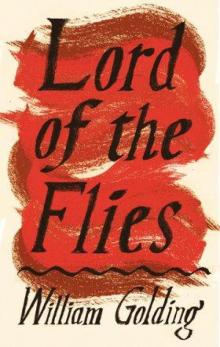 Lord of the Flies
Lord of the Flies To the Ends of the Earth
To the Ends of the Earth Free Fall
Free Fall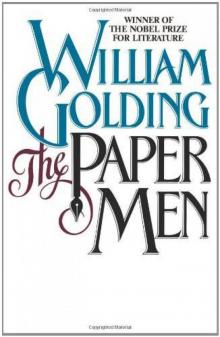 The Paper Men
The Paper Men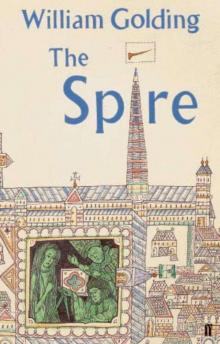 The Spire
The Spire The Scorpion God: Three Short Novels
The Scorpion God: Three Short Novels The Inheritors
The Inheritors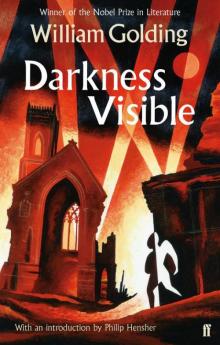 Darkness Visible: With an Introduction by Philip Hensher
Darkness Visible: With an Introduction by Philip Hensher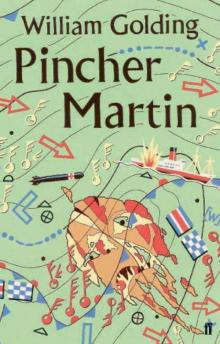 Pincher Martin
Pincher Martin The Pyramid
The Pyramid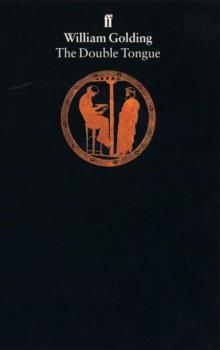 The Double Tongue
The Double Tongue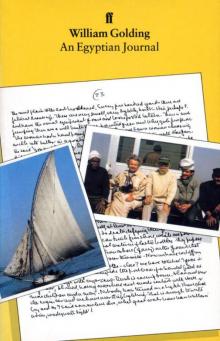 An Egyptian Journal
An Egyptian Journal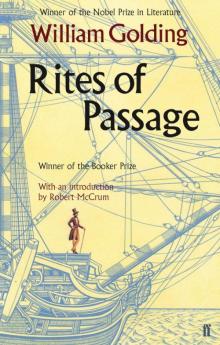 Rites of Passage
Rites of Passage Envoy Extraordinary
Envoy Extraordinary